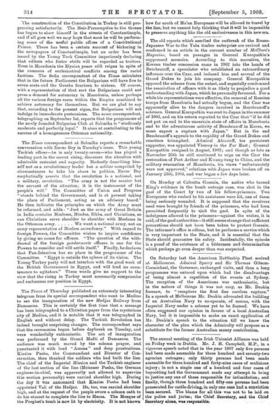The old reports which ascribed the outbreak of the Russo-
Japanese War to the Yalu timber enterprise are revived and confirmed in an article in the current number of McClure's Magazine, based on passages in General Kuropatkin's suppressed memoirs. According to this narrative, the Korean timber concession came in 1902 into the hands. of Bezobrazoff, a speculator who established, an extraordinary influence over the Czar, and induced him. and several of the Grand Dukes to join his company. General Kuropatkin opposed the scheme from the outset, and especially condemned the association of officers with it as likely to prejudice a good understanding with Japan, which he personally favoured. For a while his representations were effective, the removal of Russian troops from Manchuria had actually begun, and the Czar was apparently alive to the dangers involved in Bezobrazoff's schemes. General Kuropatkin was sent to Japan in the summer of 1903, and on his return reported to the Czar that " if he did not put an end to the uncertain state of affairs in Manchuria and to the adventurous activity of Bezobrazoff in Korea, we must expect a rupture with Japan." But in the end Bezobrazoff's appeals to the cupidity of the Grand Dukes and courtiers triumphed. Admiral Alexeieff, his persistent supporter, was appointed Viceroy in the Fair East ; General Kuropatkin resigned in August, 1903; and though as late ae November 25th he still continued to urge on the Czar the restoration of Port Arthur and Kwang-tung to China, and the military evacuation of Manchuria, his views "unfortunately were not approved," relations with Japan were broken off on January 25th, 1904, and war began a few days later.






































 Previous page
Previous page